Used as ayurvedic medicine and a staple in Indian cooking, cow ghee contains many vital nutrients which help in making the body healthy and immune to diseases. It impacts large portions of the body from the eye to the abdomen; even the bones tend to get strong due to the consumption of ghee. It is also used on wounds to speed up healing.
However, the use of milk of many mammals in making ghee has been proven in history too; but Cow has been considered the sacred animal and it has religious values too. This is one of the strong reasons why cow ghee has been used mostly as DESI GHEE, in its Indian cousin. Buffalo milk ghee is also used for eating purposes; Ayurveda considered only Old Desi Cow Milk Ghee as medicine.
What is Cow Ghee?
Cow Ghee is prepared by grass-fed cow milk, but the traditional Ghee making process is the “Bilona Ghee Making Process”. Where 70% milk is taken from the mother cow and 30% is left for Calf. This milk gets boiled till the color changes and fermented to make curd overnight.
In the morning the curd will be churned with wooden churners and cultured butter gets obtained. Next, this butter gets evaporated on high heat and impurities get separated from butter oil. This Butter oil is called COW MILK GHEE.

Nutritional Value of Cow Ghee
Cow ghee has all the necessary nutrients along with antiviral, antioxidant, antifungal and antibacterial properties. Cow ghee contains a high amount of saturated fat which is approximately 7.9 grams per serving. Just as all fats, cow ghee is comparatively high in calories; roughly one tablespoon of serving contains 112 calories.
According to the American Heart Association’s recommendation, the total fat intake should be between 25-30% of total calories. So for a person with a 2000 calories diet, the ideal fat consumption should be between 56-78 grams, of which the saturated fat shouldn’t be more than 16 grams. A healthy body can produce its own fat, but it’s beneficial to consume a little extra ghee. Refer
Medicinal uses of cow ghee
Ghrita(ghee) is useful in Vata and Pitta disorders. According to Ayurveda, the consumption of ghee in medicinal proportion is useful for general mental and physical health. It cures the diseases that occur due to the aggravation of Vata and pitta.
It gives relief from the burning sensation due to its cooling and pitta pacifying action. One can take regular ghee in small doses to improve digestion and nourish the body and mind. It makes the body strong, gives strength, and cures internal dryness. Ghee is important for brain development. So people that do a lot of mental/brain work should regularly eat ghee. After intake of ghee one shouldn’t drink water immediately.
Migraine: In migraines, cow’s ghee can be used for Nasya. Put a couple of drops of this ghee in each nostril, twice each day for one week. Or eat ten grams of cow’s ghee mixed with misri once a day every morning for three days.
Bleeding through the nose: Put a few drops of ghee in each nostril to control the nose bleeding.
Reducing toxic effects of datura, Raskapoor: Intake of ghee reduces the toxic effect of datura and ras Kapur.
Alcohol intoxication: For alcohol intoxication, the quantity of 24 grams of ghee should be consumed with an equal amount of misri.
Burn injuries: Apply ghee as an ointment to injuries. Ghee is very useful for the fast recovery of wounds and swelling. Excessive cough in children: Kid’s health gets disturbed due to the excessive coughing which prevents them from breathing comfortably. Massaging the chest with ghee is efficient for coughing.
Pacifies the Doshas : According to Ayurveda, a traditional form of ghee renowned as panchatikta ghrita is produced from the combination of five herbs that are mixed together with ghee to fight against illness, that results into the balance of Vata, Pitta, and Kapha, aa well as purification of the blood. The enigmatic components possess the in-depth tissue-penetrating, anti-inflammatory, antitoxin, and antipruritic results. Furthermore, the fragrant, therapeutic, and nutritional herbs, such as Nimba Twaka and Vasa, are all part of such medicated ghee.
Reduces Stress and Anxiety : The utility of Ashwagandha has long been considered as the foremost among all indigenous Indian herbs as it supports in calming the nervous system and lessens stress and anxiety levels. The consumption of Ashwagandha and ghee is regarded as superfoods supporting health, glowing skin and hair. Extensively considered as a Rasayana and a rejuvenator in Ayurveda as well as possessing anti-arthritic, neurological, and anti-tumor outcomes.
Better Respiratory Function : Medicinal benefits of the most potent herbs utilized during Ayurvedic recipes is vasa commonly known as Malabar nut which cures in decreasing the symptoms of bronchitis, asthma, and excessive mucus situations. Also regarded as a natural expectorant, possessing many healing characteristics, and is an excellent treatment for curing bleeding disorders, irritation in throats, coughs, colds, and respiratory issues. Hence, nutrients are effortless to ingest when combined with A2 ghee. Such particular medicated ghee enhances respiratory health and supports in the treatment of a cold and cough.
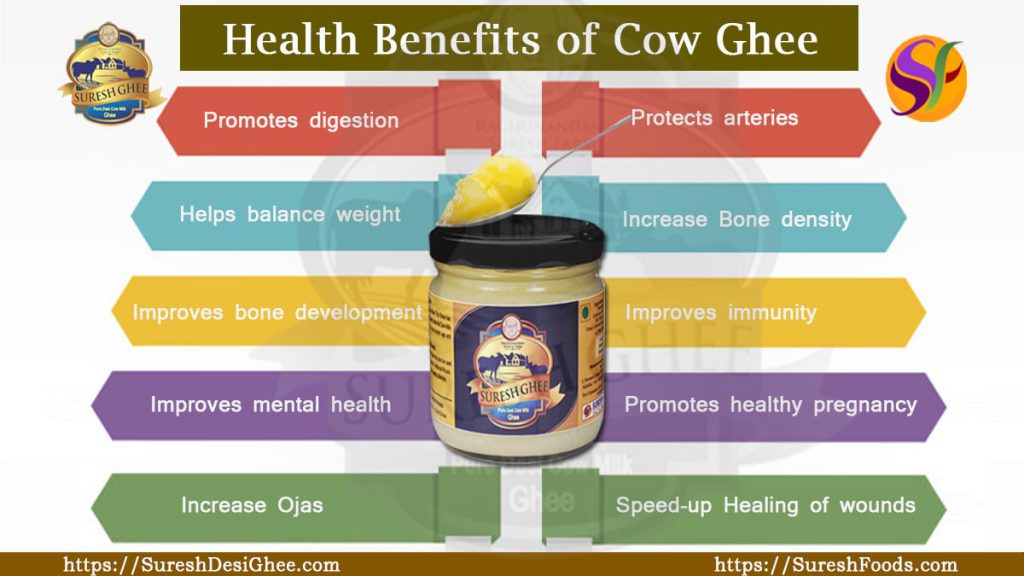
Benefits and Use of COW GHEE
- Cow Ghee has anti-aging properties that decrease bad cholesterol and facilitates excellent circulation.
- Cow Ghee provides lubrication in the body which help relief from Joint Pain
- It contains healthy fat-soluble vitamins that facilitate the absorption of nutrients in foods that are vital for health.
- The traditional method of preparing bilona churn ghee as mentioned in the shashtras, provides very deep nourishment to all of the dhatus (tissues) of the body and helps generate ojas, the most subtle material in the body.
- Cow Ghee is used in medicinal practice to help with ulcers, constipation and the promotion of healthy eyes and skin and can be used for the treatment of burns and blisters.
- Cow Ghee also helps in increasing memory, balances the mind, thus enhances brain function.
- Cow ghee contains conjugated linolenic acid which is helpful in losing weight, especially belly fat and has been known to slow the progress of cancer and heart disease.
- Gir Cow Ghee melts at 37°C and our body temperature is 37.2°C, which is why it gets totally absorbed in the body while commercial ghee melts at approx. 39°C or above which increases BP, diabetes, cholesterol and other diseases.
- Intake of ghee in therapeutic doses increases appetite and gives relief from abdominal discomfort and constipation. It also reduces burning sensation and redness of eyes significantly.
- A bleeding nose, brain stroke, sinus headaches, and migraine problem get cured completely. Add 2 drops of little bit warm cow ghee in the nostrils for a few days and see the miracle.
- Body massage with ghee boosts the immune system.
- It is recommended for those suffering from piles, fissure and fistula problems. Apply ghee directly externally for relieving pain and burning sensation. Taking ghee internally helps for softening stool and cure constipation.
- It is beneficial for curing thyroid dysfunction.

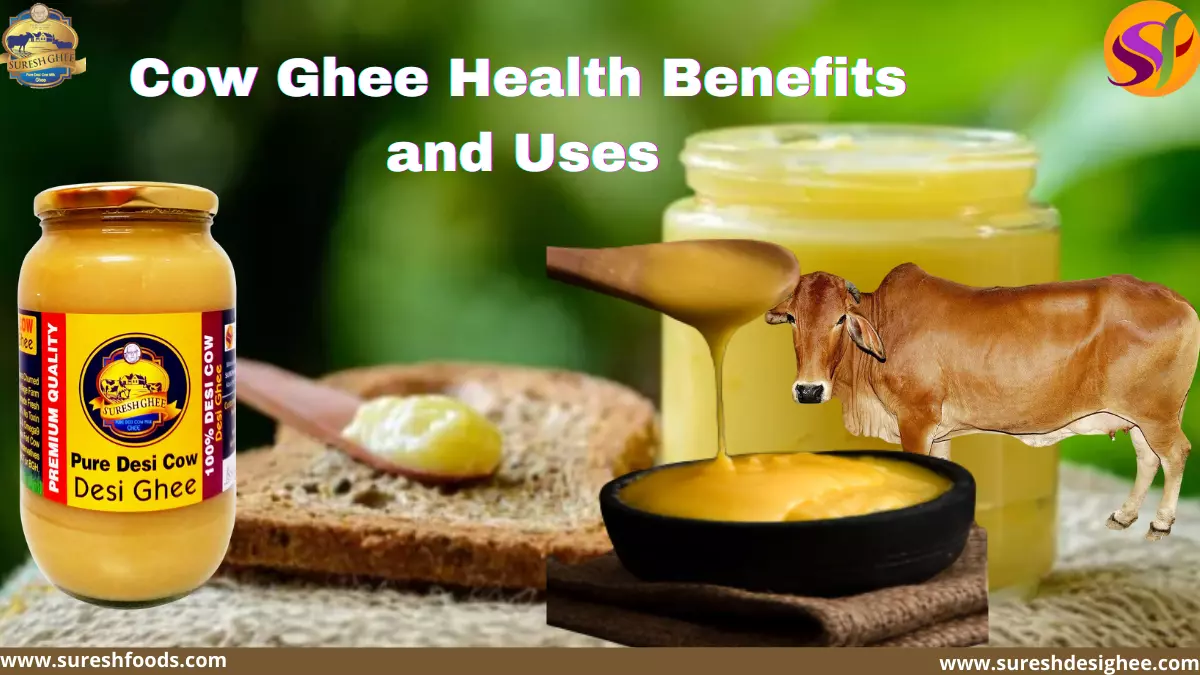

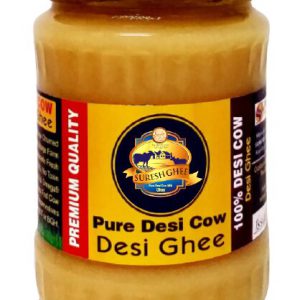
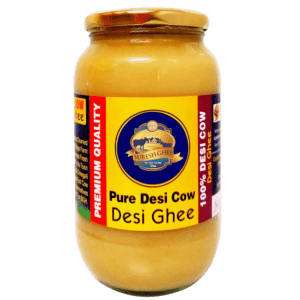
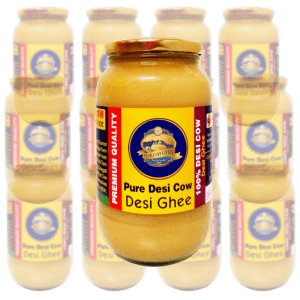
 WhatsApp us
WhatsApp us
Naveen m...